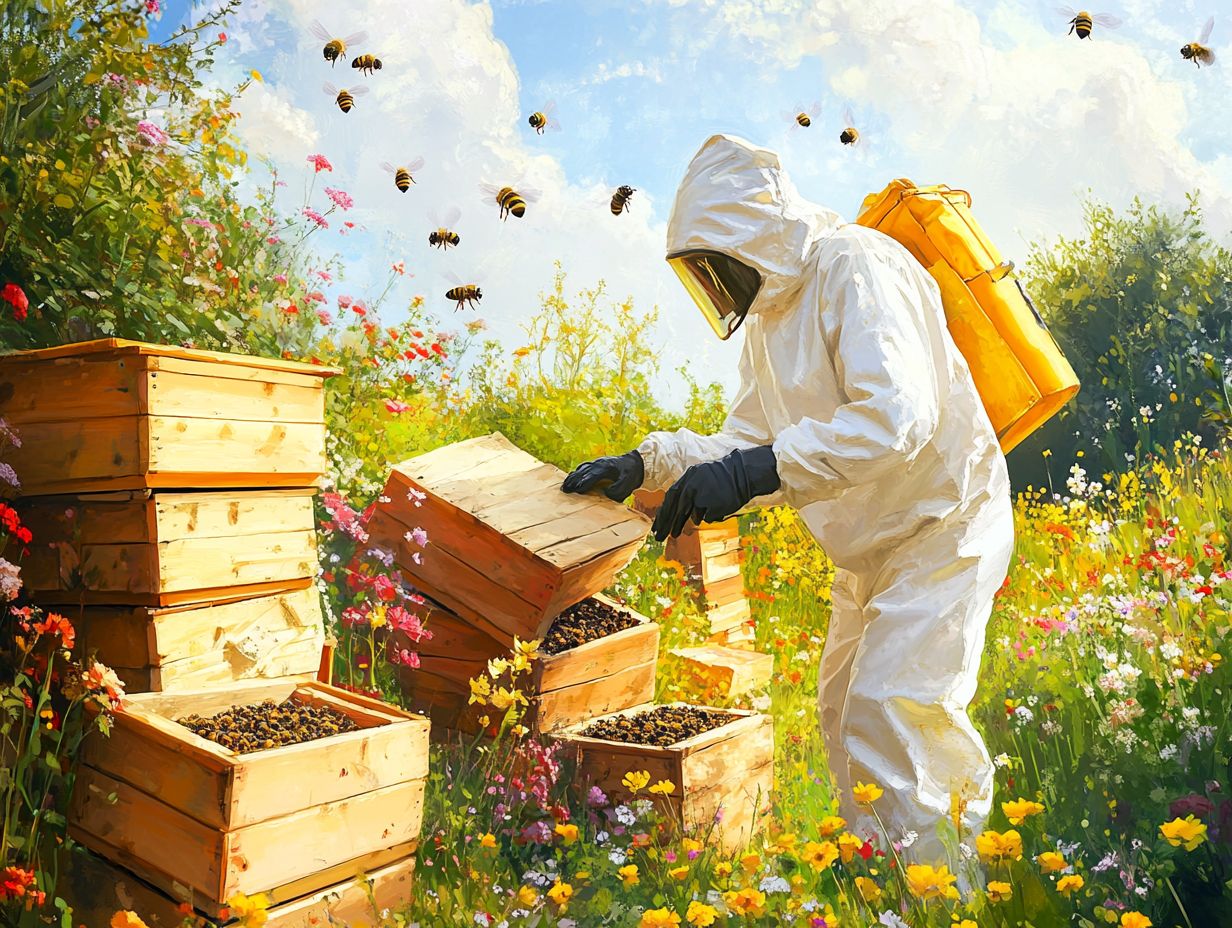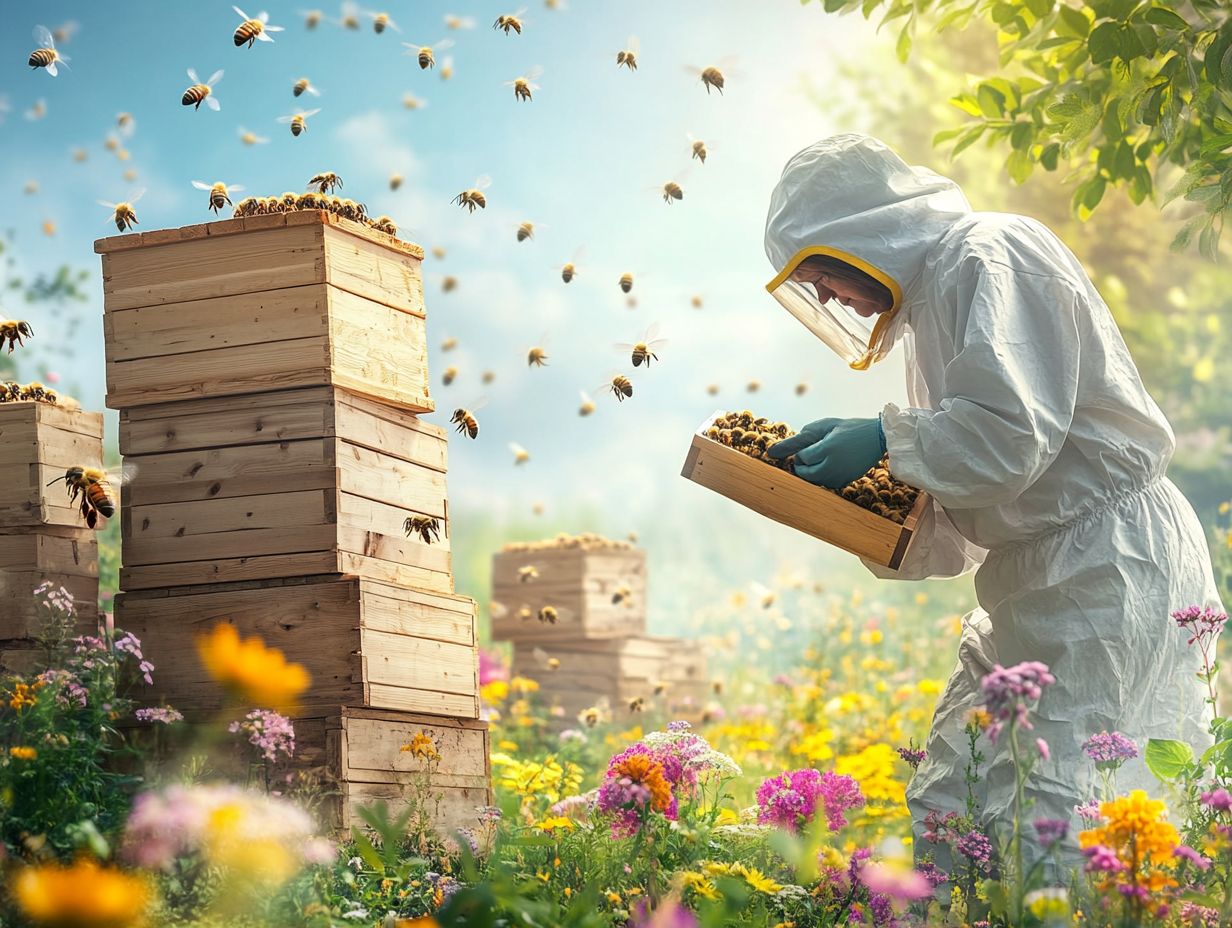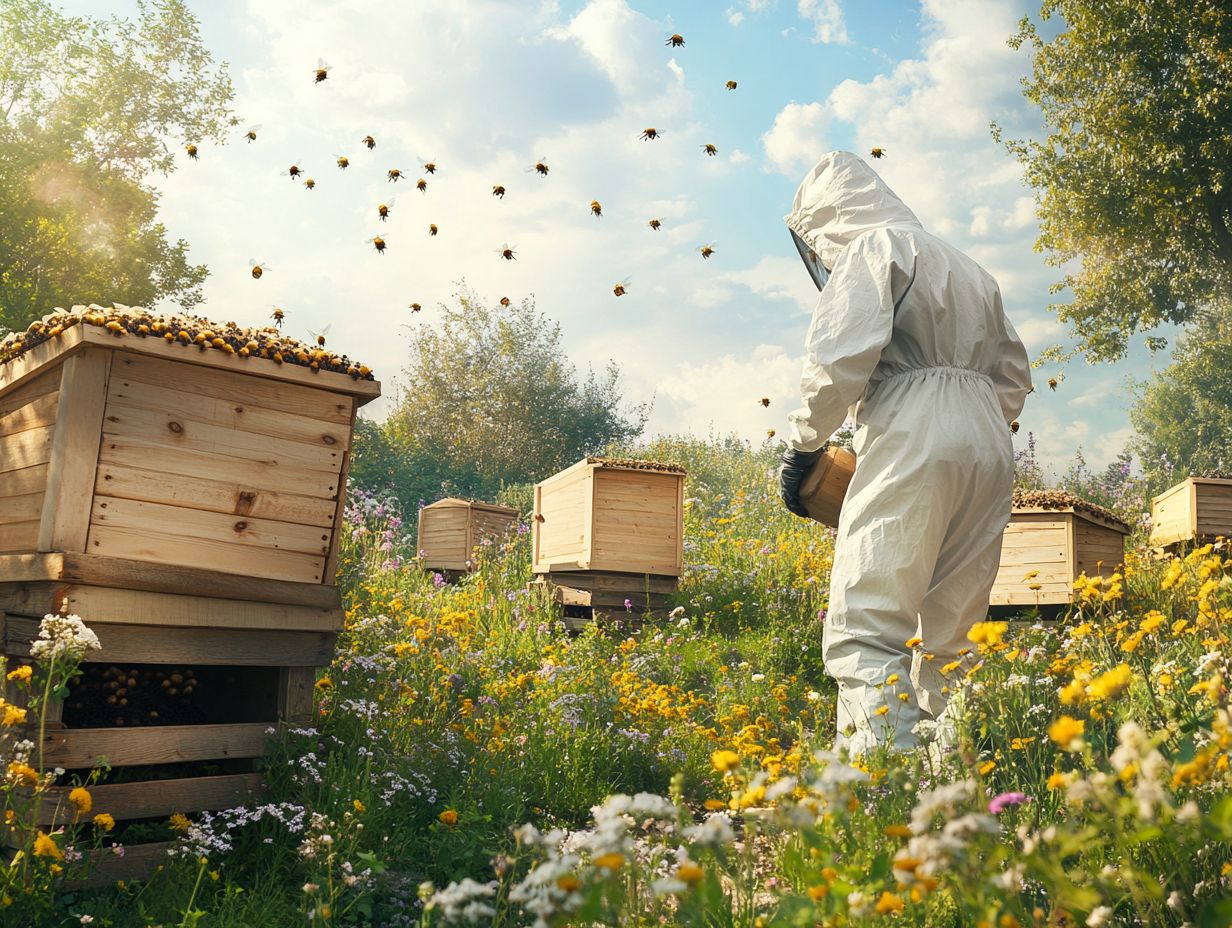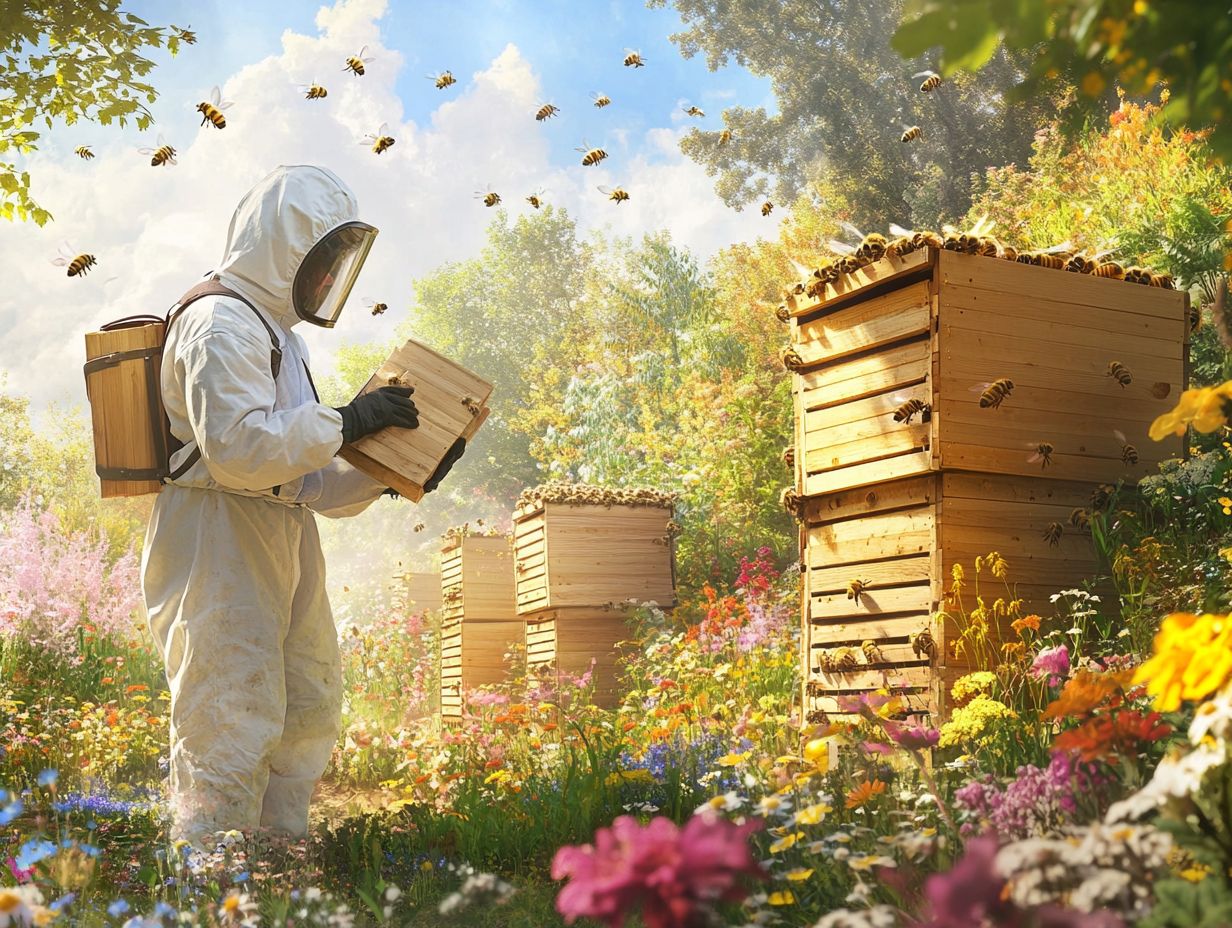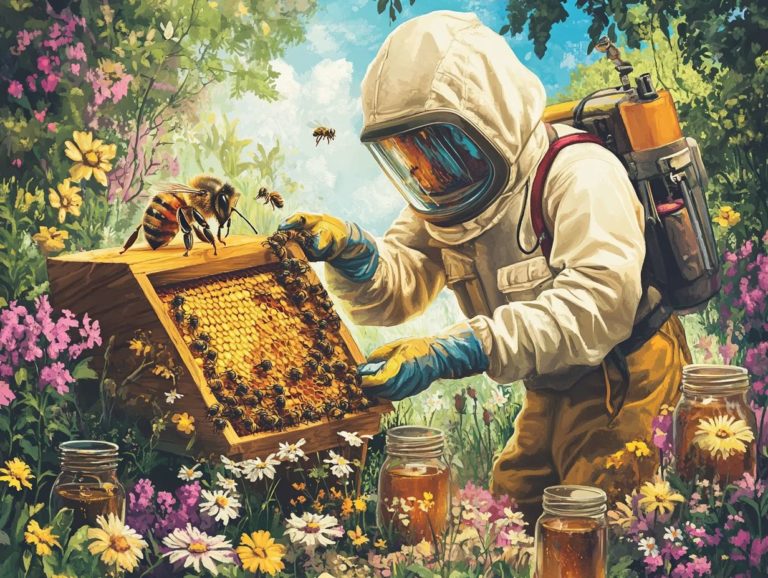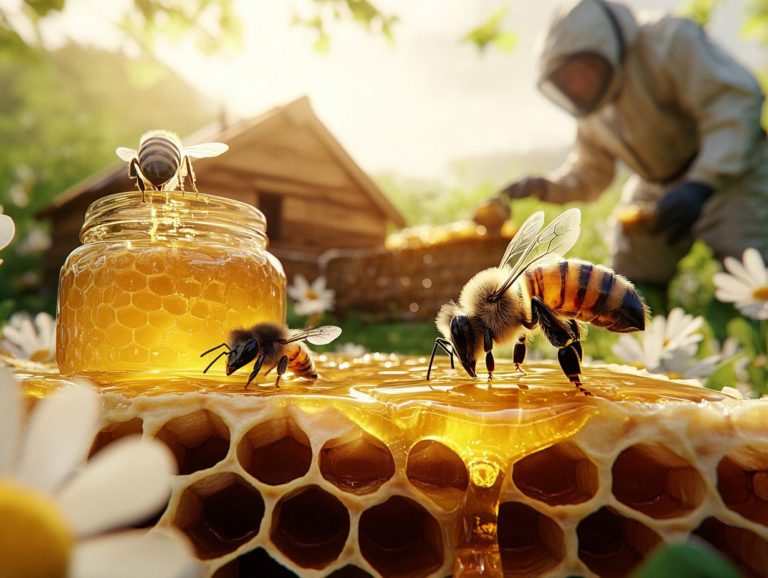Best Practices for Organic Honey Production
Organic honey production, particularly in regions like Brazil, is on the rise, recognized for its health benefits and positive environmental impact.
As you navigate the growing demand for natural and sustainable choices, grasping the requirements and best practices for producing organic honey becomes essential. This article delves into what truly defines organic honey, the challenges that beekeepers encounter, and the emerging trends that are shaping this industry.
Whether you’re a beekeeper or simply a honey aficionado, discover exciting insights into this captivating field.
Contents
- Key Takeaways:
- What is Organic Honey Production?
- Why Choose Organic Honey Production?
- What Are the Requirements for Organic Honey Production?
- What Are the Best Practices for Organic Honey Production?
- How Can You Tell if Honey is Truly Organic?
- What Are the Challenges of Organic Honey Production?
- What Are the Future Trends in Organic Honey Production?
- Frequently Asked Questions
- What are the best practices for organic honey production?
- Why is it important to follow best practices for organic honey production?
- Can I use any type of beekeeping method for organic honey production?
- Are there any specific certifications for organic honey production?
- What types of chemicals should be avoided in organic honey production?
- How can I maintain a healthy and diverse ecosystem for bees in organic honey production?
Key Takeaways:
- Organic honey production offers numerous health and environmental benefits, making it the ideal choice for conscious consumers.
- The best practices for organic honey production include using natural and organic materials, avoiding pesticides and antibiotics, proper hive management, and sustainable harvesting techniques like ethical honey harvesting.
- To ensure honey is truly organic, look for certifications from recognized organizations and check the source of the honey.
What is Organic Honey Production?
Organic honey production is all about careful beekeeping methods that focus on creating honey devoid of harmful chemicals while adhering to rigorous standards, such as those set forth by the European Union.
This practice prioritizes sustainable beekeeping methods, ensuring not only the well-being of honey bees but also that the final product—whether raw or unfiltered honey—meets the criteria for organic certification.
As a result, it captivates health-conscious consumers and environmentally aware individuals alike, offering them a choice they can feel good about.
Why Choose Organic Honey Production?
Opting for organic honey production brings a wealth of benefits, especially regarding your health and environmental sustainability. By choosing this path, you ensure that the honey you enjoy is free from chemical residues and crafted through ethical practices that prioritize the well-being of honey bees and their habitats.
It’s a choice that reflects a commitment to quality and a deeper respect for nature.
1. Health Benefits
The health benefits of indulging in organic honey are remarkable, especially when sourced from sustainable beekeeping practices. Its natural antibacterial properties ensure you’re consuming something pure, free from chemical residues.
Organic honey is packed with a wealth of vitamins and minerals that enhance your well-being. This makes it a far superior choice compared to its conventional counterpart.
Beyond these attributes, organic honey boasts a rich concentration of antioxidants, which are essential for shielding your body from oxidative stress and inflammation. These antioxidants work diligently to neutralize free radicals, ultimately supporting your overall health and enhancing the role of pollination—the process that helps plants produce food—in food production.
This sweet treat not only tastes great but also aids your digestion by promoting beneficial bacteria in your gut, leading to improved digestion and nutrient absorption. Also, incorporating this natural sweetener into your diet can significantly bolster your immune function, enabling your body to fend off illnesses more effectively.
Thus, choosing organic honey transcends mere flavor; it represents a commitment to enhancing your health and supporting sustainable agriculture through nature’s abundant offerings.
Choose organic honey today for a healthier lifestyle!
2. Environmental Benefits
Producing organic honey is crucial for our environment. It supports bee welfare and enhances pollination, which is vital for our food and ecosystems.
By prioritizing natural methods and eliminating harmful pesticides, you protect honey bees while nurturing a flourishing ecosystem. These industrious pollinators are essential for fertilizing agricultural crops and wild plant species, ensuring balance across diverse habitats.
Sustainable beekeeping practices reduce the ecological footprint of honey farming. This approach mitigates risks associated with traditional methods and fosters healthier bee populations. Ultimately, it cultivates richer biodiversity, leading to more resilient ecosystems that can withstand climate challenges.
By supporting organic honey, aren’t you also helping our planet? Your contribution champions the greater health of our environment.
What Are the Requirements for Organic Honey Production?
To achieve organic certification for honey production, you must adhere to specific requirements. This includes utilizing organic beekeeping practices, ensuring your hive is located away from contaminated areas, and employing honey harvesting methods that comply with European Union guidelines.
1. Source of Bees
The source of your bees is essential for organic honey production. As a beekeeper, ensure that you’re sourcing bees from organic environments that are free from chemical treatments.
When you source bees from certified organic suppliers, you’re giving these vital pollinators a chance to thrive in a healthy ecosystem. Raising bees organically minimizes their exposure to harmful chemical residues, protecting both the hive’s vitality and the purity of the honey you produce.
Using bees treated with synthetic pesticides or growth stimulants poses significant risks. It can compromise honey quality and increase vulnerability to disease. Embracing organic beekeeping practices not only supports biodiversity and enhances pollination but also results in honey that is healthier for consumers and boasts a richer flavor profile.
The environmental impact of sourcing organic bees is profound. It promotes a sustainable approach to agriculture that benefits us all.
2. Beekeeping Practices
Your beekeeping practices should emphasize sustainability and regenerative methods. This ensures that honey production doesn’t compromise the health of your bees, the environment, or the quality of the honey itself.
This means prioritizing natural materials for hive construction, such as untreated wood and organic treatments. These are less harmful to both the bees and their habitat. Implement safe ways to control pests, which minimizes chemical exposure and fosters a healthier environment.
Maintaining balanced bee colonies through regular health checks and avoiding overcrowding promotes resilience against diseases.
These sustainable strategies enhance honey quality and strengthen pollinator populations, benefiting the ecosystem as a whole. Join the movement for sustainable beekeeping and discover the amazing flavors of organic honey!
3. Hive Location and Maintenance
The proper location and maintenance of your hives are absolutely critical for producing organic honey. You’ll want to place your apiaries away from any sources of chemical residues. Strategically position them to maximize nectar flow for optimal honey production.
Choosing the right spot requires a thoughtful evaluation of the nearby flowering plants that can provide a consistent nectar supply throughout the blooming season. This secures abundant forage for your bees and ensures that the honey you produce is of the highest quality, free from harmful contaminants like pesticides.
Positioning your hives in areas protected from pesticides or fertilizers will secure the health of your bee population, fostering a thriving hive environment. Regular inspections and maintenance practices, such as monitoring pest levels and checking food stores, are essential for sustaining hive health and boosting productivity over time.
4. Harvesting and Processing
Harvesting and processing organic honey demands a meticulous approach that safeguards its natural qualities, ensuring that you end up with raw honey and unfiltered honey in perfect harmony with the standards expected from certified organic honey.
This involves employing specific techniques, such as gentle extraction using food-grade equipment and traditional beehive systems like Langstroth and top-bar hives. You might opt for a manual or pneumatic honey extractor, both of which minimize heat and mechanical stress. It’s imperative to avoid contamination during the harvesting and bottling stages; using food-grade equipment and maintaining a pristine environment is essential, especially when dealing with sensitive substances like oxalic acid or Apiguard.
Keeping the honey at lower temperatures preserves its beneficial enzymes and antioxidants, crucial for its nutritional value. By adhering to established organic standards and guidelines, you can produce a product that meets stringent certification requirements and delivers the health benefits associated with high-quality organic honey.
What Are the Best Practices for Organic Honey Production?
Act now to embrace the best practices for organic honey production! It’s essential to intertwine natural materials, sustainable harvesting techniques, and meticulous hive management.
This approach guarantees high-quality, pure honey and aligns seamlessly with organic certification standards. By prioritizing these methods, you can cultivate a product that truly embodies the essence of organic excellence.
1. Use of Natural and Organic Materials
Utilizing natural and organic materials in your beekeeping practices is crucial for producing organic honey. These materials help minimize the risk of chemical residues while promoting the overall health of your hive.
- Untreated wood for hive boxes
- Organic cotton for protective gear
- Natural oils for mite management
Your careful selection of materials cultivates a nurturing environment for your bees, enhancing their vitality and elevating the flavor and quality of the honey you harvest.
Choosing biodegradable materials maintains ecological balance, supporting bee populations and their vital role in pollination.
Ultimately, careful selection significantly impacts the sustainability of your honey production and fosters a healthier ecosystem for generations to come.
2. Avoiding Pesticides and Antibiotics
Avoiding pesticides and antibiotics is essential for organic honey production. These chemicals can harm bee populations and compromise the purity of your honey.
The negative impacts extend beyond bees. They disrupt entire ecosystems and lead to a decrease in pollinator diversity.
Choosing organic alternatives fosters a healthier colony environment. This promotes sustainable management practices, ensuring long-term viability.
Utilizing natural treatments and maintaining balance in the hive protects your bees. It also enhances the quality of your honey, making it a trusted organic product.
3. Proper Hive Management
Proper hive management is key to maintaining healthy colonies. It ensures the production of organic honey and addresses threats like the Varroa mite.
Establish a routine for monitoring bee health. Regular visual inspections help you catch potential issues early.
Incorporating effective pest management strategies reduces risks from various pests. Use methods like screened bottom boards and screened enclosures to help keep your hives safe.
Understanding hive dynamics is crucial. Staying vigilant helps preserve your bee colonies while promoting sustainable beekeeping practices.
4. Sustainable Harvesting Techniques
Sustainable harvesting techniques are vital for the long-term viability of honey production. They enhance bee welfare and minimize environmental impact.
Time your honey collection strategically. This ensures your colonies have enough resources to thrive through winter.
Use gentle extraction methods—like uncapping knives and centrifugal extractors designed for bees—to reduce stress on hives.
Utilizing equipment made from non-toxic materials protects the bees. It helps maintain the balance of local ecosystems.
Monitor bee health and population dynamics closely. This practice fosters robust colonies and creates a more ethical honey industry.
How Can You Tell if Honey is Truly Organic?
To determine if honey is truly organic, check for official organic certification. This assures that the honey is raw, unfiltered, and free from harmful chemicals.
Look for labels that say “USDA Organic”. These labels indicate quality and adherence to organic standards.
Investigate the sourcing practices of the producer. Beekeepers who locate their hives away from polluted areas are likely to produce genuinely organic honey.
Authentic products often exhibit unique characteristics, like distinct flavors and colors. These traits showcase the artistry behind their production.
By considering these factors, you can confidently select honey that meets your organic standards.
What Are the Challenges of Organic Honey Production?
Organic honey production poses several challenges. These include maintaining sustainable beekeeping practices and managing bee health in the face of environmental changes.
You often contend with threats from pests, particularly the Varroa mite, a parasite that can harm bee colonies and lead to significant declines in honey yield. Climate change adds complexity, disrupting nectar flow patterns and impacting bee foraging and overall hive productivity. This upheaval challenges the delicate balance necessary for successful organic operations.
Competition from conventional honey markets, which typically benefit from lower production costs and less stringent standards, also makes it difficult for organic producers to thrive economically. Yet, despite these hurdles, dedicated beekeepers like yourself champion practices that safeguard your hives and advocate for environmentally friendly agricultural methods.
What Are the Future Trends in Organic Honey Production?
Future trends in organic honey production are increasingly favoring sustainable beekeeping practices, elevated ethical standards, and heightened environmental awareness among both consumers and producers.
This shift is largely driven by technological advancements that enhance hive management and monitoring. These advancements allow beekeepers to nurture healthier colonies. As the public becomes more attuned to the ecological implications of traditional honey harvesting methods, there’s a growing demand for transparency in sourcing practices.
Consumers are not just seeking high-quality products; they are prioritizing ethically produced honey that embodies a commitment to sustainability. This intersection of innovation and ethical consumerism points to a promising future where honey production harmonizes with environmental stewardship and health-conscious values.
Frequently Asked Questions
What are the best practices for organic honey production?
The best practices include using natural methods, avoiding harmful chemicals, maintaining a healthy ecosystem for bees, and adhering to strict organic certification rules.
Why is it important to follow best practices for organic honey production?
Following these practices ensures the honey is of the highest quality, free from harmful chemicals, and environmentally sustainable. It also helps preserve bee health and maintain a robust ecosystem.
Can I use any type of beekeeping method for organic honey production?
No, not all beekeeping methods are suitable. It is crucial to use natural and sustainable methods that do not harm bees or the environment and to adhere to strict organic certification standards.
Are there any specific certifications for organic honey production?
Yes, various organic certification standards exist, such as USDA Organic, EU Organic, and Canada Organic. These certifications ensure honey is produced using strictly organic practices and meets quality standards.
What types of chemicals should be avoided in organic honey production?
It is important to avoid synthetic chemicals like pesticides and antibiotics. These can harm bees and contaminate honey, making it unsuitable for organic certification.
How can I maintain a healthy and diverse ecosystem for bees in organic honey production?
To support a healthy ecosystem for bees, provide a variety of plants for pollination, avoid monoculture farming, and limit chemical use in the surrounding area. This approach supports bee health and ensures sustainable honey production.

